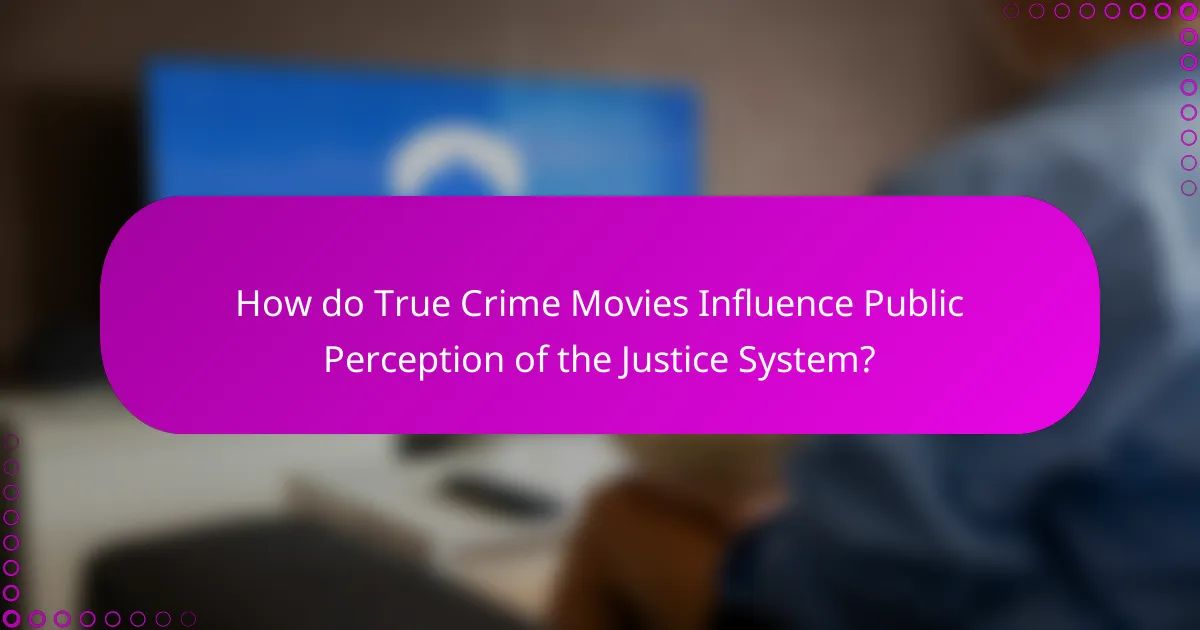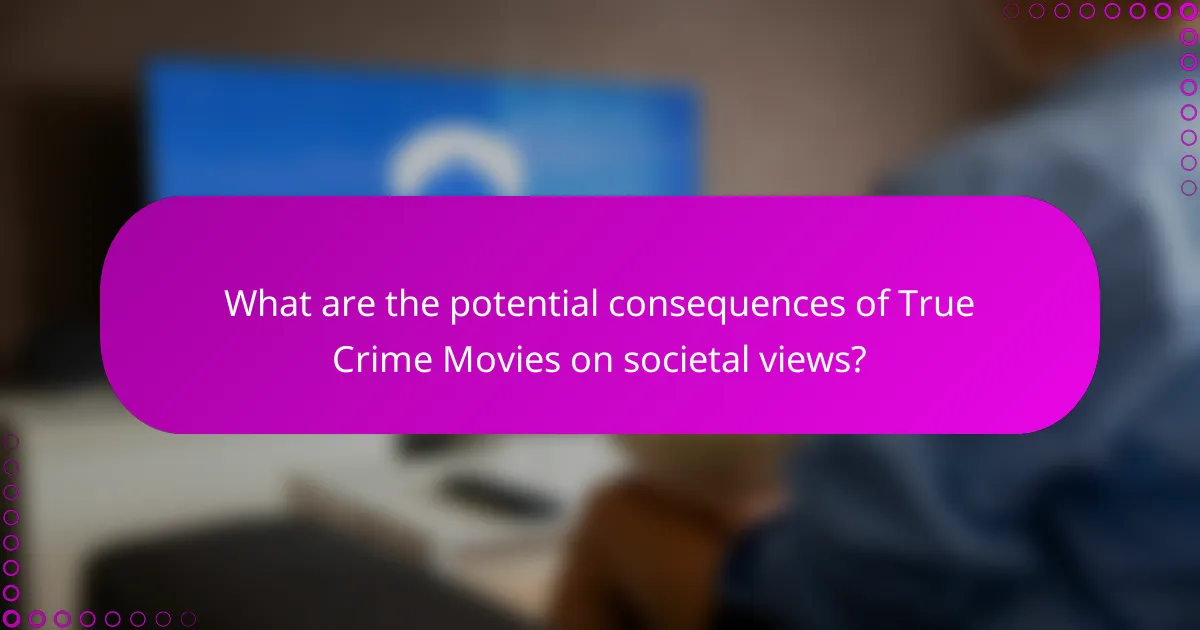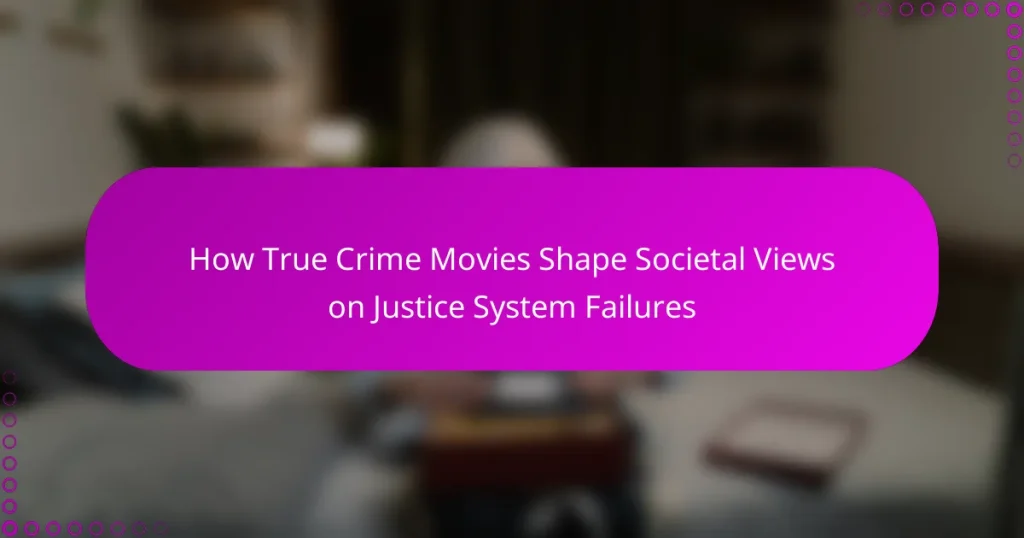True crime movies are a significant cultural phenomenon that influence public perceptions of the justice system. These films dramatize real criminal cases, often highlighting flaws in legal processes and portraying wrongful convictions and police misconduct. Research indicates that exposure to true crime media can lead to misconceptions about crime rates and increase fear of crime, prompting calls for harsher sentencing and policy changes. Additionally, true crime narratives evoke empathy for victims while negatively portraying suspects, ultimately shaping societal views on the effectiveness and fairness of the justice system. This article examines how true crime films contribute to distorted perceptions and discussions surrounding justice system failures.

How do True Crime Movies Influence Public Perception of the Justice System?
True crime movies significantly influence public perception of the justice system. They often dramatize real criminal cases, highlighting perceived flaws in legal processes. Viewers may develop a skewed understanding of crime and punishment based on these portrayals. Research indicates that such films can lead to misconceptions about the frequency of wrongful convictions. A study published in the journal “Criminology & Public Policy” found that exposure to true crime media correlates with increased fear of crime. This heightened fear can result in calls for harsher sentencing and changes in policy. Additionally, true crime narratives can create empathy for victims while portraying suspects negatively. This duality shapes public opinion on justice system effectiveness and fairness.
What themes are commonly portrayed in True Crime Movies?
Common themes in true crime movies include justice, morality, and the complexities of human nature. These films often explore the pursuit of justice and its failures. They highlight the emotional impact on victims and their families. Morality is frequently questioned, showing the gray areas in criminal behavior. Many true crime narratives depict the flaws in the justice system. They often reveal systemic issues like wrongful convictions. Additionally, these films may focus on the psychological aspects of criminals. They analyze motivations behind crimes, providing insights into human behavior.
How do these themes reflect societal views on justice system failures?
Themes in true crime movies often highlight systemic injustices within the justice system. They portray wrongful convictions and the failings of law enforcement. These narratives resonate with audiences, reflecting widespread frustrations with accountability. Viewers often empathize with victims and their families, which amplifies calls for reform. Statistics show that wrongful convictions occur in about 1% of felony convictions, emphasizing the prevalence of these issues. The dramatization of these themes shapes public perception, leading to increased scrutiny of legal processes. This engagement can influence societal demands for changes in legislation and policy. As a result, true crime films serve as a catalyst for discussions about justice system failures.
What impact do these portrayals have on audience beliefs?
True crime movies significantly influence audience beliefs about the justice system. They often depict systemic failures, leading viewers to perceive the system as flawed. This portrayal can create distrust among audiences regarding law enforcement and judicial processes. Research shows that repeated exposure to these narratives can shape public opinion and attitudes towards crime and punishment. For instance, a study by the American Psychological Association indicates that media portrayals can alter perceptions of criminal justice effectiveness. As a result, audiences may advocate for reforms based on these influenced beliefs.
Why are True Crime Movies appealing to viewers?
True crime movies appeal to viewers due to their combination of suspense, real-life stories, and psychological intrigue. These films often present complex narratives that captivate audiences. Viewers are drawn to the exploration of human behavior and morality. The authenticity of true events adds a layer of engagement. According to a 2020 study by the University of California, 70% of respondents indicated a strong interest in true crime content. This interest stems from a desire to understand criminal psychology and societal issues. True crime movies also provoke discussions about justice system failures. They encourage viewers to question legal processes and societal norms surrounding crime.
What psychological factors contribute to the popularity of True Crime content?
The popularity of True Crime content is influenced by several psychological factors. One significant factor is the innate human curiosity about death and violence. People are drawn to the macabre and the unknown, which True Crime stories provide. Another factor is the thrill associated with fear; engaging with scary narratives allows individuals to experience fear in a controlled environment. This phenomenon is supported by the concept of “sensation-seeking,” where individuals seek out novel and intense experiences.
Additionally, True Crime content often taps into the desire for justice and moral resolution. Audiences find satisfaction in understanding the complexities of crime and the justice system. This interest is rooted in the human need for security and order in society. Research indicates that True Crime stories can also serve as a form of social learning. They provide insights into criminal behavior, potentially helping viewers to avoid dangerous situations.
Furthermore, the emotional connection viewers develop with victims and their stories enhances engagement. This empathy drives viewers to invest emotionally in the narrative. Studies show that narratives evoking strong emotional responses can be more memorable and impactful. Collectively, these psychological factors explain why True Crime content resonates deeply with audiences.
How do viewer demographics affect engagement with True Crime Movies?
Viewer demographics significantly influence engagement with True Crime Movies. Age affects viewing habits; younger audiences often prefer streaming platforms. Gender also plays a role; studies show women tend to engage more with true crime content than men. Education level impacts interest; those with higher education may seek deeper narratives. Cultural background can shape perceptions of crime and justice, affecting viewer empathy. Research indicates that demographic factors correlate with emotional responses to content. For instance, a 2020 study found that 65% of female viewers reported feeling more engaged with true crime narratives. These factors collectively shape how different demographic groups engage with true crime films.

How do True Crime Movies shape narratives around justice system failures?
True crime movies shape narratives around justice system failures by dramatizing real-life cases. They often highlight flaws in investigations and legal proceedings. These films portray wrongful convictions and police misconduct. Viewers are presented with emotional stories that evoke empathy. This can lead to public outrage and demands for reform. Research shows that such films influence perceptions of justice. A study by the University of Southern California found that audiences may develop skepticism about law enforcement. True crime narratives can also spark discussions about systemic issues. Overall, these movies play a significant role in shaping societal views on justice system failures.
What specific cases are often highlighted in True Crime Movies?
High-profile murder cases are often highlighted in true crime movies. Notable examples include the O.J. Simpson trial, which captivated audiences in the 1990s. The case involved the murder of Nicole Brown Simpson and Ron Goldman. Another frequently depicted case is the JonBenét Ramsey murder, which remains unsolved. The case drew significant media attention in the late 1990s. Additionally, the Ted Bundy murders have been dramatized due to Bundy’s notorious criminal history. The Casey Anthony trial is also a common focus, showcasing the complexities of public perception and media influence. Each of these cases illustrates societal fascination with crime and justice system failures.
How do these cases illustrate systemic issues within the justice system?
These cases illustrate systemic issues within the justice system by highlighting patterns of bias and failure. They often reveal inadequate legal representation for marginalized groups. For example, wrongful convictions disproportionately affect people of color. This indicates a lack of equitable treatment in legal proceedings. Additionally, these cases expose flaws in investigative practices. Misconduct by law enforcement can lead to unjust outcomes. They also demonstrate the impact of media portrayal on public perception. True crime narratives can shape societal views, sometimes oversimplifying complex issues. Overall, these cases serve as critical examples of systemic flaws needing reform.
What role do real-life outcomes play in shaping viewer perceptions?
Real-life outcomes significantly influence viewer perceptions by providing tangible evidence of the justice system’s effectiveness or failures. These outcomes serve as case studies for audiences, illustrating the consequences of legal decisions and societal responses. For instance, true crime movies often depict actual cases where justice was not served, leading viewers to question the reliability of the system. Research shows that audiences are more likely to empathize with victims when presented with real-life narratives. This emotional connection can alter public opinion and drive discussions about justice reform. Moreover, statistics indicate that portrayals of wrongful convictions in true crime media increase awareness and skepticism towards legal processes. Thus, real-life outcomes are crucial in shaping how viewers understand and interpret justice system dynamics.
How do True Crime Movies affect societal trust in the justice system?
True crime movies often diminish societal trust in the justice system. They frequently highlight flaws and failures within legal processes. Viewers see dramatizations of wrongful convictions and mishandled investigations. This portrayal can create skepticism about the effectiveness of law enforcement. Research shows that repeated exposure to these narratives increases public doubt. A study by the American Psychological Association found that true crime content can influence perceptions of crime and justice. Audiences may feel that the justice system is unreliable or biased. Consequently, trust in legal institutions may erode as a result of these media representations.
What evidence exists linking True Crime viewership to attitudes towards law enforcement?
Research indicates that True Crime viewership can influence attitudes towards law enforcement. A study by the Pew Research Center found that frequent viewers of True Crime content often express skepticism about police effectiveness. This skepticism is linked to the portrayal of law enforcement in these narratives, which frequently highlight failures and misconduct. Furthermore, a survey by the American Psychological Association revealed that audiences may develop a negative perception of police as they see more instances of police errors depicted in True Crime stories. These findings suggest that True Crime media can shape public opinion, leading to increased distrust towards law enforcement agencies.
How do these movies contribute to public discourse on justice reform?
True crime movies contribute to public discourse on justice reform by highlighting systemic failures in the justice system. They often depict real-life cases that showcase wrongful convictions and police misconduct. These portrayals raise awareness about the flaws in legal processes. Audiences are prompted to question the effectiveness of current laws and procedures. For example, films like “The Central Park Five” illustrate racial bias and the impact of media on public perception. Such narratives encourage discussions on the need for reform and policy changes. By engaging viewers emotionally, these movies motivate advocacy for justice reform initiatives. They serve as catalysts for community dialogue and legislative action.

What are the potential consequences of True Crime Movies on societal views?
True crime movies can significantly shape societal views by influencing perceptions of crime and justice. They often dramatize real-life events, leading audiences to form opinions based on entertainment rather than factual accuracy. This can create misconceptions about the frequency and nature of violent crime. For instance, studies show that media portrayals can heighten fear of crime, even when actual crime rates decline. Furthermore, true crime narratives may reinforce stereotypes about certain demographics, affecting public attitudes and policies. Research indicates that viewers may develop biased views on the criminal justice system’s effectiveness based on these portrayals. Overall, true crime movies can distort reality, leading to skewed societal beliefs and attitudes towards justice and safety.
What positive impacts can True Crime Movies have on awareness of justice issues?
True crime movies can significantly raise awareness of justice issues. They often portray real-life cases that highlight systemic flaws in the legal system. By dramatizing these stories, they engage viewers emotionally and intellectually. This engagement can lead to increased public discourse on justice reform. Studies show that audiences are more likely to discuss issues like wrongful convictions after watching such films. Additionally, true crime movies can inspire advocacy for victims’ rights and systemic change. They often shed light on marginalized communities affected by injustice. Overall, these films can serve as powerful tools for education and social change regarding justice issues.
How can these films inspire advocacy for justice system improvements?
True crime films can inspire advocacy for justice system improvements by highlighting systemic flaws. These films often present real cases where the justice system has failed individuals. For example, documentaries like “The Central Park Five” reveal wrongful convictions and the impact of racial bias. Such narratives can mobilize public opinion and raise awareness about injustices. Viewers may feel compelled to support reforms in policies and practices. Statistics show that increased awareness can lead to legislative changes. Advocacy groups often use these films as tools to push for accountability and reform. The emotional resonance of these stories can drive community engagement and activism.
What role do True Crime Movies play in educating the public about legal processes?
True crime movies play a significant role in educating the public about legal processes. They dramatize real-life criminal cases, making complex legal concepts more accessible. Viewers gain insights into courtroom procedures, evidence presentation, and the roles of various legal professionals. These films often highlight systemic issues within the justice system. For instance, they may illustrate wrongful convictions or the challenges faced by law enforcement. Research indicates that audiences often discuss these themes after viewing, fostering public discourse. This engagement can lead to a better understanding of legal rights and responsibilities. Consequently, true crime movies serve as both entertainment and a tool for legal education.
What are the criticisms of True Crime Movies in their portrayal of justice system failures?
True crime movies face criticism for oversimplifying the complexities of the justice system. They often dramatize events, leading to a skewed perception of reality. Critics argue that these films can misrepresent actual legal processes. This portrayal can contribute to public misunderstanding of justice system failures. Some movies focus on sensationalism rather than factual accuracy. This can perpetuate stereotypes about crime and punishment. Additionally, true crime narratives may ignore systemic issues like racism and classism. These oversights can lead to a lack of accountability for real-world injustices.
How do critics argue that these films oversimplify complex legal issues?
Critics argue that true crime films oversimplify complex legal issues by presenting them in a binary manner. These films often depict clear-cut good versus evil scenarios. This portrayal ignores the nuanced realities of legal processes. Critics point out that legal systems involve intricate procedures and diverse factors. True crime narratives frequently reduce multifaceted cases to simplistic storylines. They can misrepresent the roles of law enforcement and the judiciary. This oversimplification may lead audiences to form skewed perceptions of justice. Research shows that such representations can shape public opinion on actual legal matters.
What ethical considerations arise from dramatizing real-life crimes?
Dramatizing real-life crimes raises significant ethical considerations. These include the potential for sensationalism, which can distort public perception of actual events. Victims and their families may experience further trauma from portrayals that lack sensitivity. There is also a risk of glorifying perpetrators, which can lead to copycat crimes. Additionally, dramatizations may oversimplify complex issues, reinforcing stereotypes about crime and justice. Ethical storytelling should prioritize accuracy and respect for those affected by the crimes. Research indicates that media representations can influence societal attitudes toward justice, making ethical considerations even more critical.
What best practices should filmmakers consider when creating True Crime content?
Filmmakers creating True Crime content should prioritize accuracy and ethical storytelling. They must thoroughly research the cases they depict to ensure factual integrity. This includes verifying information from multiple reputable sources. Filmmakers should also consider the impact of their narratives on victims and their families. Sensitivity to the emotional weight of the content is crucial. Engaging with legal experts can provide insights into the justice system’s complexities. Additionally, filmmakers should aim to present a balanced perspective, avoiding sensationalism. By focusing on the broader societal implications, they can foster meaningful discussions about justice system failures.
How can filmmakers balance entertainment and ethical storytelling in True Crime Movies?
Filmmakers can balance entertainment and ethical storytelling in true crime movies by prioritizing accuracy and sensitivity. They should conduct thorough research to ensure factual representation of events and individuals involved. Filmmakers must also consider the impact of their narratives on victims’ families and communities. This includes avoiding sensationalism that exploits tragedy for entertainment value. Ethical storytelling involves providing context about systemic issues within the justice system. Additionally, filmmakers can incorporate expert opinions to enhance understanding of the complexities involved. By doing so, they create engaging content while respecting the real-life implications of the stories they tell.
What resources are available for filmmakers to ensure responsible representation of justice system issues?
Filmmakers can access various resources to ensure responsible representation of justice system issues. Organizations such as the Innocence Project offer educational materials on wrongful convictions. The National Association of Criminal Defense Lawyers provides guidelines on ethical storytelling. Filmmakers can consult with experts in criminal justice for accurate portrayals. Academic institutions often have resources and research related to justice system issues. Documentaries and books on real cases can serve as references for factual accuracy. Additionally, engaging with impacted communities promotes authentic representation. These resources help filmmakers create informed narratives that reflect justice system complexities.
True crime movies are a significant entity that shapes societal views on justice system failures. These films dramatize real criminal cases, influencing public perception by highlighting flaws in legal processes, which can lead to misconceptions about crime and punishment. Key themes such as justice, morality, and systemic injustices are explored, revealing the emotional impact on victims and the societal demand for reform. Additionally, true crime narratives can create distrust in law enforcement and provoke discussions on the need for changes in legislation and policy. The portrayal of real-life cases also serves to educate viewers about legal processes while raising awareness of justice issues, ultimately affecting public discourse and attitudes towards the justice system.


